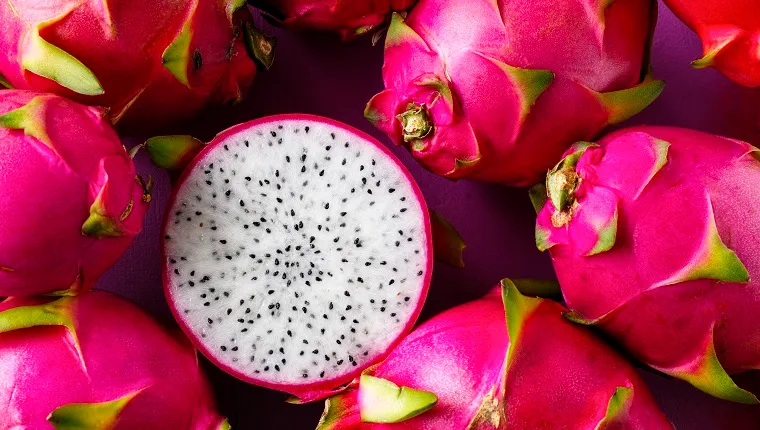Hey there, curious pet parents and dog lovers! Today, we’re diving into a fruity topic that’s sure to pique your interest—dragon fruit and its suitability for our canine companions. Join me as we uncover whether this exotic treat is safe for dogs and what benefits it may offer to our furry friends.
What is Dragon Fruit?
Let’s start with the basics—dragon fruit, also known as pitaya, is a tropical fruit native to Central and South America. It comes in several varieties, but the most common ones have vibrant pink or yellow skin with green scales and a sweet, juicy interior speckled with tiny black seeds.
Types of Dragon Fruit
There are primarily two types of dragon fruit: the pink-skinned variety with white flesh and the yellow-skinned variety with either white or pink flesh. Both types are packed with nutrients like vitamins, antioxidants, and fiber, making them a popular choice for health-conscious humans.
Can Dogs Safely Eat Dragon Fruit?
Now, onto the main question—can dogs indulge in this tropical delight? Let’s explore the safety aspects and potential benefits for our canine companions.
Nutritional Value of Dragon Fruit
Dragon fruit is low in calories and rich in vitamins C, B1, B2, and B3, as well as minerals like iron, calcium, and phosphorus. Its high fiber content promotes digestion and supports overall gut health, which can be beneficial for dogs in moderation.
Potential Benefits for Dogs
While dogs don’t require fruit in their diet, small amounts of dragon fruit can provide them with vitamins and antioxidants that support their immune system and promote skin and coat health. The fruit’s hydration properties can also contribute to their overall well-being.
Risks and Considerations
Digestive Upset
Like any new food, introducing dragon fruit to your dog’s diet should be done gradually and in small amounts. Too much fruit, especially for dogs not accustomed to it, can lead to digestive issues such as diarrhea or stomach upset.
High Sugar Content
Dragon fruit is naturally sweet, and while it’s not as high in sugar as some other fruits, excessive consumption can still contribute to weight gain and potential dental problems in dogs. Moderation is key to avoid these issues.
How to Feed Dragon Fruit to Your Dog
Preparation and Serving
Before offering dragon fruit to your dog, peel off the outer skin and remove any seeds, as they can pose a choking hazard. Cut the flesh into small, bite-sized pieces to make it easier for your dog to chew and digest.
Frequency and Portion Control
As with any treat, including fruits, dragon fruit should only be given to dogs occasionally and in moderation. A few small pieces as an occasional treat or mixed with their regular food can add variety to their diet without causing harm.
Can All Dogs Eat Dragon Fruit?
Considerations for Dogs with Health Conditions
If your dog has diabetes or other health conditions that require careful management of sugar intake, consult with your veterinarian before introducing dragon fruit or any new food into their diet. They can provide guidance tailored to your dog’s specific needs.
Allergies and Sensitivities
While allergies to dragon fruit are rare in dogs, some may be sensitive to new foods. Watch for signs of allergic reactions such as itching, swelling, or gastrointestinal distress, and discontinue feeding dragon fruit if any adverse symptoms occur.
Conclusion
In conclusion, dragon fruit can be a nutritious and refreshing treat for dogs when offered in moderation and with proper preparation. Its vitamins, minerals, and fiber content can provide some health benefits, but it should complement a balanced diet suitable for your dog’s individual needs.
Is dragonfruit safe for dogs?
Dragon fruit, when prepared and given in moderation, is generally safe for dogs to consume. It offers vitamins, fiber, and antioxidants that can benefit their health, but should be introduced gradually to avoid digestive upset.
How to prepare dragon fruit for dogs?
To prepare dragon fruit for your dog, peel off the outer skin and remove any seeds, as they can pose a choking hazard. Cut the flesh into small, bite-sized pieces to make it easier for your dog to eat and digest.
Is dragon fruit cactus toxic to dogs?
Dragon fruit, despite its name and appearance, is not toxic to dogs. It belongs to the cactus family, but its flesh is safe and even beneficial for dogs when offered in appropriate amounts.
Is dragon fruit good for cats and dogs?
Dragon fruit can provide nutritional benefits for both cats and dogs due to its vitamins, fiber, and antioxidants. However, cats are obligate carnivores and may not derive as much nutritional value from fruits compared to dogs.
Can dogs be allergic to dragon fruit?
While allergies to dragon fruit are rare in dogs, some may be sensitive to new foods. Watch for signs of allergic reactions such as itching, swelling, or gastrointestinal distress when introducing dragon fruit to your dog’s diet.
What fruit should dogs avoid?
Dogs should avoid fruits such as grapes and raisins, which can be toxic and cause kidney failure. Additionally, citrus fruits like lemons and limes can cause gastrointestinal upset due to their high acidity.
Which fruit is poisonous to cats and dogs?
Grapes and raisins are considered highly toxic to both cats and dogs, potentially causing severe kidney damage even in small amounts. It’s crucial to keep these fruits out of reach and to seek veterinary care immediately if ingestion is suspected.
- Best Dun & Bradstreet (DNB) Alternatives for 2025 - April 19, 2025
- Best 6sense Alternatives for 2025 - April 18, 2025
- Best Instantly.ai Alternatives for 2025 - April 18, 2025



